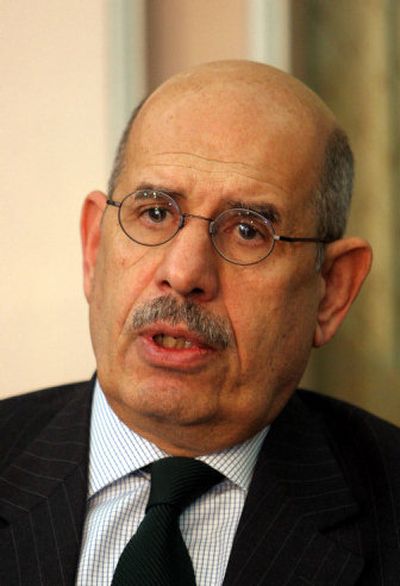U.S. seeks tough steps over Iran’s nuke work

WASHINGTON – The United States declared Wednesday that the U.N. Security Council should take “strong steps” against Iran after Iran’s claim that it had enriched uranium in defiance of an international call to suspend its enrichment work.
European powers, Russia and China joined the United States in criticizing Iran’s announcement Tuesday that it had succeeded in enriching uranium to a level suitable for civilian power reactors. The same process, on a much larger scale, can produce fuel for nuclear weapons.
But Russia and China – veto-wielding permanent Security Council members with huge financial stakes in oil-rich Iran – haven’t backed sanctions.
Some experts said the Bush administration should consider a new strategy that recognized Iran as a regional power, embraced direct talks on the nuclear crisis and other issues, and dropped the threat of force.
Iranian leaders on Wednesday reaffirmed their plan to build an industrial-scale enrichment facility with thousands of centrifuges that spin uranium hexafluoride gas into low-enriched uranium for power plants and also can produce highly enriched uranium for nuclear weapons.
“The Iranian nation will not retreat from gaining peaceful nuclear technology,” President Mahmoud Ahmadinejad said.
He spoke hours before Mohamed ElBaradei, the head of the U.N. International Atomic Energy Agency, arrived in Tehran for talks. ElBaradei is to deliver a report to the Security Council by April 28 on whether Iran is heeding the council’s demand to suspend all enrichment work.
Iran says its program is for peaceful purposes, but its admission of hiding the effort for 18 years and its refusals to disclose details have fueled U.S. and European charges that it’s secretly developing a nuclear arsenal.
The Security Council statement underscored that “the world does not believe that Iran should have the capability and the technology that could lead to a nuclear weapon,” Secretary of State Condoleezza Rice said Wednesday.
Other American officials have said the United States probably would seek a Security Council resolution – which has the force of international law – embodying the demands of the council’s March 28 statement, which was nonbinding.
The United States estimates that Iran is at least five years away from being able to produce enough highly enriched uranium for a nuclear weapon. Independent estimates put a worst-case scenario at three years.
John Bolton, the U.S. ambassador to the United Nations, said last week that the United States and some of its allies were discussing taking action outside the Security Council if it couldn’t get sanctions.
Options being considered, according to U.S. and foreign officials, include boosting efforts to halt Iran’s importation of technology that could be used for nuclear, chemical and biological weapons, finding ways to counter financing for Iranian weapons programs and limiting visas and travel for Iranian officials.
“What this suggests is that we need more of a robust and effective diplomatic strategy,” said Daryl Kimball, the executive director of the Arms Control Association.
He said the Bush administration should be prepared to engage in direct talks with Iran on the nuclear crisis and other issues, rule out military strikes and agree to allow the European Union to offer greater economic rewards for an end to enrichment.